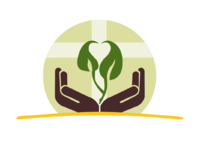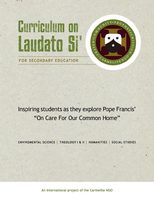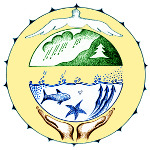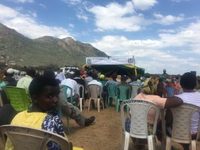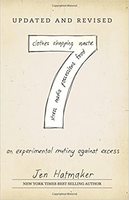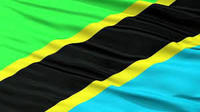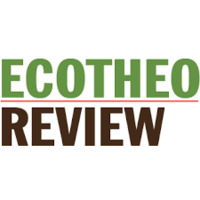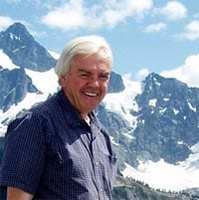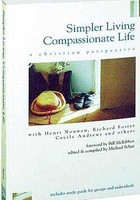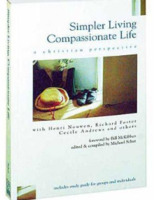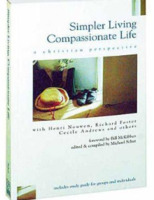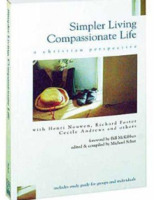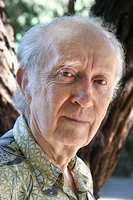Search
1263 items
-
Ideas for Earth Day Sunday Celebrations
Creation Justice Ministries has created a list of ways to celebrate Earth Day Sunday this year on their website. On the webpage they include educational ideas, prayer examples, leading by example, and celebrating in God’s creation by immersing yourself in it. Links to sustainable products are also listed. -
Laudato Si’ Can Change the World
The Carmelite NGO has created new curriculum on Laudato Si’: Laudato Si’ Can Change the World. It is meant for grades 9-12 and also includes an adult study guide meant for study groups or college classes. The program is available to purchase on their website. -
Eco-Prayer Guidelines
Eco–Prayer Guidelines offers suggestions for eco-prayer and good will intentions. They describe eco-prayer principles and explain why praying and positive intentions are important. Their 9 principles are listed in the guidelines and more information on the definition of eco-theology. -
San Diego Creation Care Team Success Stories
Catholic Climate Covenant has created two short videos to discuss how different churches in the San Diego diocese in California have worked to be better stewards of God’s creation. The parish of Our Mother of Confidence in San Diego, California, has taken action to reduce water and energy usage while the Saint James Parish and Academy in Solana Beach, California, has implemented environmentally conscious projects and initiatives in their community. -
Earth Sangha
Earth Sangha is a non-profit public charity based in Washington, DC. Their mission is to work towards ecological restoration as a form of socially engaged Buddhism. Although they work in the spirit of Buddhist practice, their volunteers come from a wide variety of backgrounds, and their work is secular and science based. -
Radical Joy for Hard Times
Radical Joy for Hard Times is a worldwide community of people dedicated to bringing meaning, beauty, and value to places that have been damaged by human or natural acts. Rad Joy educates, supports, and connects communities around the world to create Earth Exchanges, experiential gatherings in which people visit wounded places, get to know them as they are now, share their stories of what they mean to them, and make a simple, spontaneous work of art there. Often, this “gift to the place” is the Rad Joy Bird, made by the group out of materials found on site. -
Quaker Earthcare Witness
Quaker Earthcare Witness is a network of Quakers that are taking spirit-led action to address the ecological and social crises of the world from a spiritual perspective. They support reforms in laws, technology, education, and institutions, but their main focus is on facilitating the transformation of humans’ attitudes, values, identity, and worldview that underlie much of the environmental destruction going on in the world today. -
Partnership for Earth Spirituality
From their website, Partnership for Earth Spirituality is a "non-profit organization that brings together people from various religious traditions, ages, cultures and economic backgrounds to promote a better understanding of the interdependence of ecology and spirituality". Their "vision is explored through retreats, forums, seasonal rituals, wilderness experiences, programs for children, hands-on projects and education for sound environmental policies". Several resources and partnerships are listed on their website. -
Laudato Si’ Reflection Resource
This reflection on Laudato Si’ is a resource from Ecospirituality. It highlights important quotes and offers additional resources related to creation care. Suggested actions are listed in addition to the weekly reflection program. -
Ecospirituality Resources
Ecospirituality Resource is a website that connects concern for creation with growing faith, integrates new scientific discoveries with beliefs and lifestyles, and deepens the understanding of threats to Earth’s life systems and the call to respond. Everything on the website is free and downloadable. -
World Environment Day in Ruvu Mungano Tanzania
From Natalie Georgalas:
"On July 5, I spent the day at a World Environment Day celebration in a camp known as Loresho on the outskirts of the village of Ruvu Mungano in the district of Same in Tanzania. Loresho camp has been established by the Tanzanian government to help relocate people who have been affected by the flooding of the Ruvu River. The guest of honor for the ceremony was the Regional Commissioner who spoke of the relief the government was providing to the people and also how all the people of Same can make a difference on World Environment Day. The focus for the celebration was planting trees, which was done at the end of the ceremony to show a good example.
After the regional commissioner spoke, the regional bishop of the KKKT (in Swahili it is Kanisa la Kinjili la Kiluteri Tanzania) Northern Diocese Lutheran Church spoke about World Environment Day as well. Because the ceremony was given in Swahili, Mr. Gerry Mmbaga, who works for the Kilimanjaro Hope Organization (Kiho), did his best to translate it for me.
The Bishop spoke about the Bible, and how God created the world but he created the man last. As he created the first man, Adam, he ordered him to take care of each and every thing concerning the environment. He also discussed how conserving the world was ordered by God because the environment is life; without the environment there is no life. He emphasized that God created the world first and the man last and ordered the man in the Eden Garden to take care of the environment.
The translation from Swahili to English can sometimes be tough, but the main idea remains. If you would like to read more about Kiho, you can click here. If you are interested in learning more, I will be posting more about the religious organizations in Marwa, a village in the Same district, and how they engage with sustainable community development".
-
7: An Experimental Mutiny Against Excess
Overwhelmed by the excess in her own life, Jen Hatmaker and her family set out on a project they called “Seven.” Highlighting seven areas of excess, they committed to living a little more simply every month. Originally published in 2011 and updated in 2017, 7 has been utilized for book studies in many Christian faith communities. For those overwhelmed with the task of implementing creation care in their own lives, Hatmaker’s memoir tells of her family’s practical and faith inspired experiment. More information about Hatmaker’s project can be found on her blog. -
Evangelical Environmental Network: Resource Page
The online resource page for the Evangelical Environmental Network (EEN) offers many helpful resources for clergy and lay persons looking to engage their faith with care of the environment.
This page gives introductory resources for those entering the conversation as well as practical implementation of creation care. Sermon starters and devotionals provide links for personal or community consideration of scripture and environment. It also links to books recommended by the EEN in Creation Care, Food and Food Policy, National Parks and Public Lands, Sustainable Business, and Children’s books. This section of the page may be especially useful for those looking to do a book study in creation care. -
Podcast: Young Minds Big Questions – An Interview with Brian McLaren
“Climate Change and Christianity – An Interview with Brian McLaren” was released on April 26, 2017, and is the first part of a two part conversation on climate change and Christianity. The interviewee, Brian McLaren is an author, speaker, activist, and public theologian. His work as a pastor led him to begin writing, and he has published numerous books on faith and Christian life.
McLaren unpacks some of the science behind global climate change and its everyday effects for human life around the world. Looking at the dangers of a changing climate, he turns to faith as the inspiration for advocacy and change. Ultimately, McLaren attributes reluctance to accept or take action to prevent climate change, in part, to a certain kind of eschatology. He then mentions instances in which congregations, inspired by care for God’s world, made real changes to combat climate change. The podcast concludes with McLaren’s own recommendations for any Christian wanting to learn more about creation care. -
Dayton Divests
In June 2014, the University of Dayton became the first Catholic university in the United States to announce their divestment from coal and fossil fuels. Members of the university staff see this move as part of the university’s commitment to “being a responsible steward of the Earth’s natural resources.” This decision was commended by the president of the Association of Catholic Colleges and Universities. Their decision was one inspired by faith reflection as well as a commitment to financial stability for the university.
Beyond divesting from coal and fossil fuels, the university has taken further steps to move their campus toward efficiency and sustainability. The university now has two full time employees who work to improve campus sustainability and offers academic programs in these areas as well. The University of Dayton is also home to the Hanley Sustainability Institute. -
Pope Tells Oil Executives to Act on Climate: "There Is No Time to Lose’”
This past Saturday, the pope gathered leaders of the world’s largest oil companies for a closed-door conference at the Vatican. He commended oil and gas companies for progress made in developing more careful approaches to assess of climate risk and adjustments made to their business practices. However, these actions are not enough. Pressure has been building on oil and gas companies to transition to less polluting forms of energy, often coupled with the threat of fossil-fuel divestment.
The pope reiterated his call for a transition from fossil fuels “to a greater use of energy sources that are highly efficient while producing low levels of pollution.” He emphasized that the poor who would suffer the most from the effects global warming. And that we owe it to the poorer countries and future generations. -
Religion and Development in Tanzania
From Natalie Georgalas's Research Project:
For the month of June, I will be interviewing different religious denominations in the village of Marwa in Tanzania. There are a total of five different denominations within this rural village: Pentecost, Lutheran, Muslim, Seventh-day Adventist, and Catholic. The purpose of these interviews is to ultimately help the OSU Maji Marwa project learn more about the people of Marwa in order to offer them the best possible assistance. This is also a personal research project.
My original plan was not to make a post about each of these interviews. However, after interviewing in a few of the denominations, I changed my mind. I first spoke with the Pentecost ya Umoja Marwa church, which translates to Pentecost Church of Unity in Marwa. I first met the pastor, Mbatiani, and he radiated light. We do not speak the same language, but I could feel the love his smile radiated. After interviewing him and a few of the parishioners, they asked me if I could share their message of love with my friends in America, so I asked them if they would like me to make a post and they very excitedly agreed. So, I thought I would make one post about this specific church and their views on the relationship between sustainable community development and their religion.
Subsequently, after interviewing the Masji min auwarami, which translates to Mosque of Muslim Unity, and the Marwa Seventh-Day Adventist church, I have decided to write a post about each of the different denominations I interview.
I am inspired by the positivity and love that the religious leaders and parishioners have towards me, a complete stranger from across the world who does not even speak their language. I think that it would be unfair for me not to share these messages, and so with the blessing of my collaborators, I will be posting small descriptions of my conversations along with pictures and videos I have taken along the way. -
Association of Catholic Colleges and Universities
Founded in 1899, The Association of Catholic Colleges and Universities (ACCU) formed to represent the community of Catholic colleges and Universities in the United States. Connected to the universities and the church, the ACCU functions as a support for universities and offers opportunities through work at member institutions.
The published infographic on Catholic Higher Education and Environment offers great examples of Catholic institutions intentionally caring for creation. The infographic features three different environmental initiatives at Lourdes University in Ohio. -
EcoTheo Review
In 2013, several seminary friends set out to bring ecological and faith groups together and to “create a lasting affection toward the natural world.” The EcoTheo Review publishes art on their website and through their digital quarterly. Sharing writings and art, their active website and blog continue to publish posts in between official publication of the journal. Instructions on how to submit works and donate are included on the website -
Profile: Calvin DeWitt
Calvin DeWitt is a scientist, speaker, activist, and author of books like Earthwise: A Guide to Hopeful Creation Care (2011) and Song of a Scientists: The Harmony of a God-Soaked Creation (2012) in addition to countless articles. He is interested especially in the intersection of faith and action on the environmental crisis. With publications dating back to the 1960s, for decades DeWitt has been a force in creation care. He is also a founder of the Evangelical Environmental Network. -
“Worldviews” in Simpler Living, Compassionate Life
Simpler Living, Compassionate Life, is a book from Earth Ministries that consists of both essays and community guides regarding humanity’s relationship to our earthly home. This section, "Worldviews," takes a close looks at what has led humans to treat the earth so poorly. It highlights various ways of viewing and comprehending the world around us, especially in the West. It offers that ideas such as dualism have been toxic to our understanding of the world and our relationship to it. -
"Theology in Support of Simplicity and Eco-Justice" in Simpler Living, Compassionate Life
Simpler Living, Compassionate Life, is a book from Earth Ministries that consists of both essays and community guides regarding humanity’s relationship to our earthly home. This section, "Theology in Support of Simplicity and Eco-Justice," captures the Biblical and faith inspired foundation of the movement toward simplicity. It encourages those who are participants in a culture of over-consumption to reconsider their lifestyles and reverse the damage done to the gift that we have received. -
“Simplicity is Nothing New” in Simpler Living, Compassionate Life
Simpler Living, Compassionate Life, is a book from Earth Ministries that consists of both essays and community guides regarding humanity’s relationship to our earthly home. This section, "Simplicity is Nothing New," looks back to ways that the Holy Spirit has inspired simplicity in the lives of Christians through the ages. It provides a framework for the 21st century pursuit of simplicity in American and Christian history. -
"Social Structures and the Politics of Simplicity" in Simpler Living, Compassionate Life
Simpler Living, Compassionate Life, is a book from Earth Ministries that consists of both essays and community guides regarding humanity’s relationship to our earthly home. This section, "Social Structures and the Politics of Simplicity," looks at systems in society that perpetuate and encourage over-consumption. From theology to capitalism to advertising, authors call out ways in which we have built our world for destruction. It focuses not only on personal choices, but the necessity of engaged politics and policy. For the full version Moriah Reichert's review of this section of the book, visit the link below. -
Profile: John B. Cobb Jr.
John B. Cobb is an American theologian working in ecology and creation care. The prolific author of more than fifty books has argued inside the church and the academy for faith inspired environmental action. He began writing on faith and environmentalism in the 1970s and has remained a prominent activist and theologian through his life. In 2014, Cobb’s accomplishments were celebrated when he was inducted into the American Academy of Arts and Sciences.
Cobb and his students put together an early Ecotheology book list, current through 1991. Cobb’s speeches and works can be found online, and his books can be found at many major retailers and your favorite independent bookstore.

